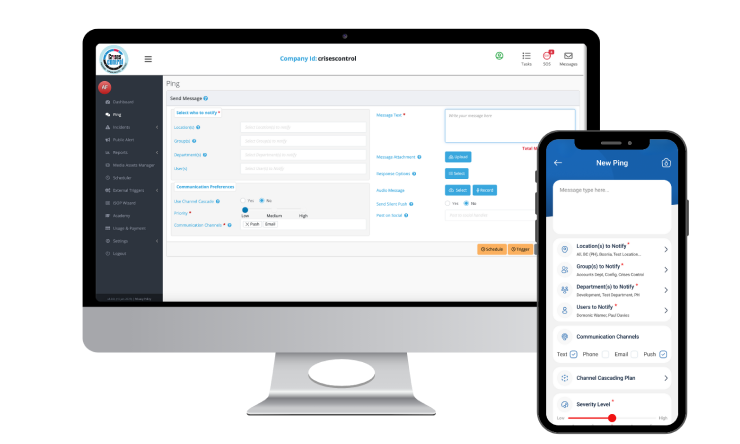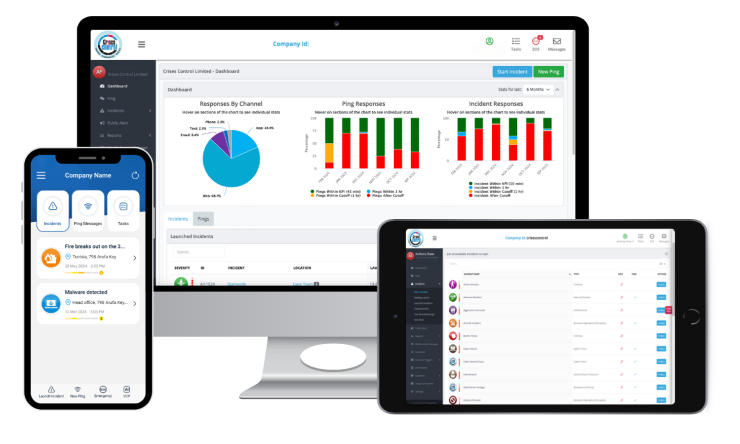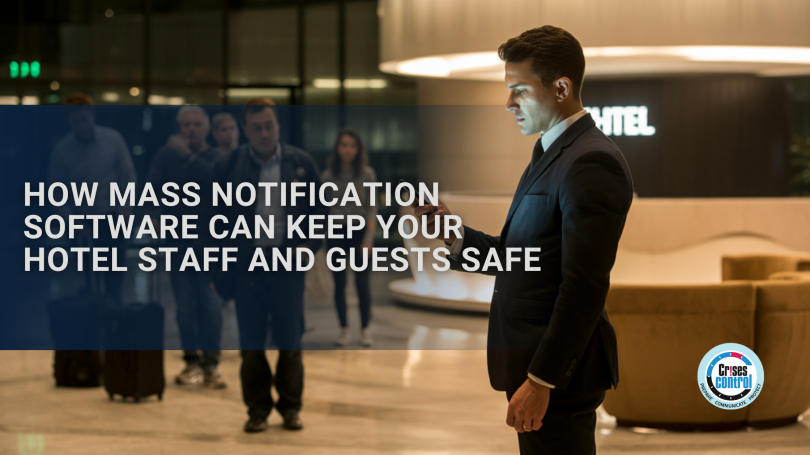Written by Anneri Fourie | Crises Control Executive
Picture this. The fire alarm goes off in a busy hotel on a Saturday evening. Guests are scattered across the property – in rooms, at the restaurant, in the spa, and at an event in the ballroom. Some panic, others freeze, and staff are suddenly trying to guide hundreds of people to safety while keeping track of who is where. Without a fast and reliable way to alert and direct both staff and guests, confusion spreads quickly and safety is at risk.
This is not an unlikely scenario. Hotels face challenges that go far beyond providing a comfortable stay. Power failures, violent incidents, cyberattacks, health emergencies, and fires can all happen with little or no warning. The real question is how prepared a hotel is to respond when things go wrong.
Mass notification software provides a solution by giving managers a way to communicate instantly across multiple channels. Crises Control Ping is designed for this exact purpose. It delivers the right information to the right people at the right time, helping hotels manage emergencies with clarity and confidence.
Why Hotels Need Mass Notification Software
Hotels are complex environments. Unlike offices or warehouses, they welcome large numbers of people who are often unfamiliar with the building and its procedures. At the same time, staff can be spread across a wide area, from front-of-house to kitchens, housekeeping, maintenance, and event spaces.
This creates several challenges:
- Guests do not know the safety protocols. While staff may have received training, guests rarely know how to react during an incident.
- High staff turnover reduces preparedness. Hotels often rely on seasonal or temporary staff, many of whom are not familiar with emergency response plans.
- Buildings are large and dispersed. Communication across multiple wings or floors takes time, and delays can have serious consequences.
- Reputation can be damaged quickly. A poorly handled emergency can make headlines, damage guest confidence, and affect bookings for months or even years.
Mass notification software helps hotels overcome these issues by providing a clear, structured way to reach everyone instantly. Messages can be sent within seconds, removing confusion and making sure staff and guests know exactly what to do.
How Crises Control Ping Works in Hospitality
Crises Control Ping is not just another alert system. It has been designed to meet the unique needs of industries like hospitality, where safety and clear communication can make all the difference.
Multi-Channel Alerts
Messages are sent through SMS, voice calls, emails, push notifications, and desktop popups. Using multiple channels ensures alerts reach recipients quickly, even if one method fails.
Targeted Notifications
Instead of alerting everyone at once, hotels can send messages to specific groups such as kitchen staff, housekeeping, security, or senior management. This avoids unnecessary panic and keeps communications precise.
Ready-to-Use Templates
Emergencies often require immediate action. Pre-built templates for incidents like evacuations, IT failures, or health alerts allow staff to act without wasting time drafting messages. Custom templates can also be created for hotel-specific risks.
Two-Way Communication
Ping is not just about sending messages. Staff can confirm they have received instructions, request assistance, or share updates. This feedback loop helps managers track progress and adjust responses in real time.
Interested in our Ping Mass Notification Software?
Efficiently alert everyone in seconds at scale with our Mass Notification Software.

Risks Hotels Face and How Ping Responds
Every hotel faces a range of potential risks. Some are common, while others may be rare but extremely serious. Crises Control Ping provides tailored support across these scenarios.
Active Threats
From disruptive guests to more serious security incidents, staff need to respond quickly. Ping can send clear instructions to lock down certain areas, alert security, and provide live updates to management and law enforcement.
Fires and Major Safety Incidents
A fire in a hotel demands fast, coordinated evacuation. Ping supports evacuation protocols, tracks staff responses, and helps confirm when areas are clear. This also helps meet regulatory fire safety requirements.
Health Emergencies
Pandemics and outbreaks of illness, such as food poisoning, require fast communication with both staff and health authorities. Ping makes it easy to alert teams, share safety guidance, and reduce the risk of escalation.
Utility Failures
Hotels rely on constant access to power, water, and IT systems. When outages occur, Ping can notify staff immediately, coordinate maintenance teams, and keep guests informed of temporary measures.
Cybersecurity Incidents
Guest data is a prime target for cybercriminals. If a hotel experiences a data breach or ransomware attack, Ping allows secure communication between IT, management, and regulatory contacts without exposing sensitive details.
Compliance and Audit Support
Hotels must comply with strict regulations, covering everything from fire safety to data protection. Meeting these obligations can be difficult, especially during inspections or audits.
Crises Control Ping supports compliance by creating a record of alerts, responses, and drills. This evidence can be used to demonstrate compliance with:
- UK: Health & Safety at Work Act, Regulatory Reform (Fire Safety) Order, and GDPR.
- EU: Health & Safety Directives, GDPR, and Food Hygiene Regulation.
- USA: OSHA requirements, ADA standards, and NFPA codes.
- Middle East: Local fire and labour regulations, plus tourism safety requirements.
- Canada: PIPEDA, occupational health and safety, and provincial fire and food safety laws.
For hotel managers, this means fewer worries about failing inspections, reduced legal risk, and clear evidence of a commitment to safety.
Lessons from Real Incidents
Recent events have shown how quickly hotels can be thrown into crisis.
- Storm Babet in the UK (2023): Flooding forced hotels to evacuate guests at short notice. A system like Ping could have helped managers direct guests calmly and track staff responses.
- Ransomware attack on a US hotel chain (2023): Guest data was stolen, creating chaos for IT and management teams. Secure communication tools would have reduced confusion and supported a faster response.
- Armed robbery at a Middle Eastern resort: Staff needed rapid coordination with security teams. A mass alert system could have ensured safety while authorities were contacted.
- E. coli outbreak in a European hotel restaurant: Guests and regulators had to be informed immediately. Ping would have allowed the kitchen team and health authorities to act faster and limit reputational damage.
Each example underlines the same point: speed and clarity are essential. Hotels that cannot communicate quickly risk both safety and reputation.
Everyday Benefits Beyond Emergencies
Mass notification systems are not only useful during crises. Hotels can use Ping to improve day-to-day operations:
- Shift management: Alert staff about rota changes or call in cover for sickness.
- Guest communications: Share information about check-in, events, or local disruptions.
- Maintenance coordination: Notify engineers when equipment breaks down.
- Training and drills: Run evacuation exercises and record compliance evidence.
This flexibility means the investment in Ping provides value every day, not just during emergencies.
Why Crises Control Ping Works for Hotels
When comparing mass notification software for hospitality, hotels need a solution that is easy to use, secure, and adaptable. Crises Control Ping delivers this by offering:
- A mobile-first design that works well for staff who are constantly on the move.
- Multi-language options to support diverse teams and international guests.
- GDPR-compliant infrastructure to protect sensitive information.
- Scalable deployment suitable for small boutique hotels or global chains.
The result is a tool that strengthens both safety and operational resilience, giving staff and guests peace of mind.
Take the Next Step
Keeping people safe is the foundation of hospitality. Guests expect it, and staff deserve it. Crises Control helps hotels respond faster, reduce confusion, and maintain trust, no matter the situation.
See how it works in practice and how it could protect your hotel. Contact our team and book a free demo today.
Request a FREE Demo

